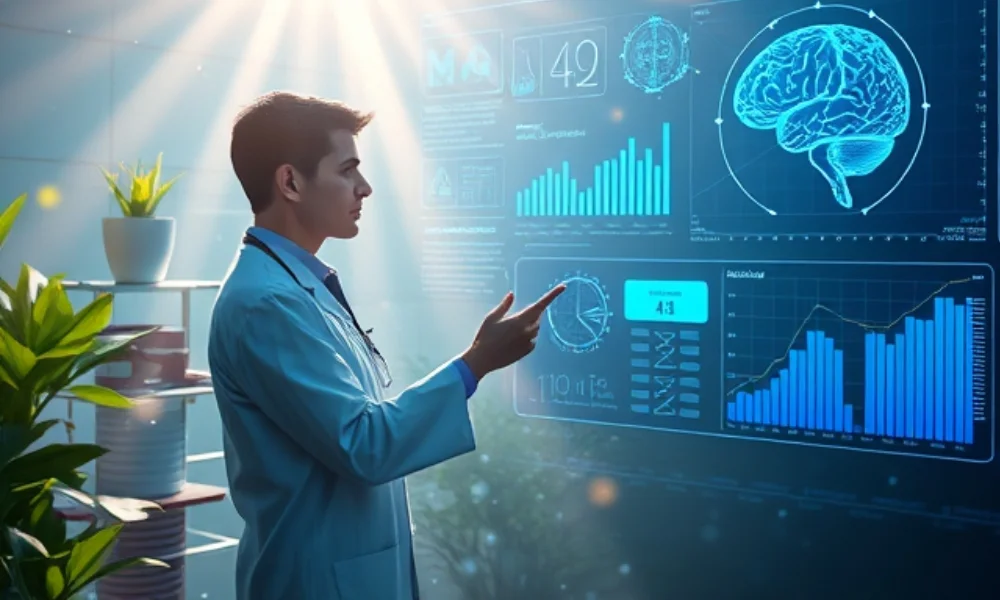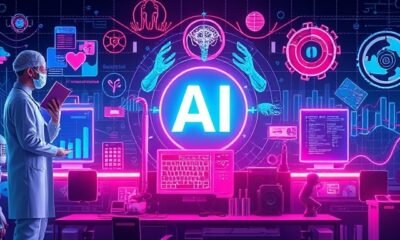Artificial Intelligence
Disease Prediction Using AI: Transforming Healthcare with Technology
Modern healthcare depends on artificial intelligence to detect diseases at their earliest stages while improving precision treatment and disease prevention measures. The article explores how life-saving medical developments form the pathway toward next-generation medical practices.

It would be fantastic to know about diseases before they appear. The capability of AI to anticipate diseases stands as the key benefit of disease prediction systems. This technology transforms healthcare practice through its life-saving potential which detects early risks and enables preventive care as well as lowers healthcare expenses. This article demonstrates how AI technologies analyze data to generate predictions about medical risks while providing solutions for cancer and heart disease and infectious outbreaks.
Definition:
Disease prediction using AI refers to leveraging Artificial Intelligence to analyze medical data, detect patterns, and predict potential risks for illnesses.
AI-powered predictions are becoming a game-changer in healthcare, proving to be more precise and efficient than traditional methods. Now, let’s see how AI makes this possible and why it matters.
What is Disease Prediction in Healthcare?
Predicted diseases emerge when health data leads professionals to foresee upcoming medical conditions. Through its enhanced operational abilities AI goes beyond what humans can detect to identify multiple risk indicators.
How does AI improve upon traditional methods?
Regular predictions make use of standard checklists together with normative parameters. Artificial intelligence probes beyond conventional patterns which produces an extremely precise understanding of potential risks. Early proactive measures enabled by this approach result in improved health outcomes together with decreased risks of medical complications.
How AI Predicts Disease Risks?
AI is revolutionizing healthcare by identifying risks through innovative approaches.
How does AI use patient data?
The system extracts data points from patient records including medical histories combined with lifestyle elements and exposure to surroundings. A wide-ranging assessment system recognizes warning signs before they become severe.
Can AI analyze genetic predispositions?
Absolutely. Genetics is a vital component. Using artificial intelligence technologies hereditary risk evaluation accompanies an assessment of family-linked disease development potential including diabetes and cancer.
What role does pattern recognition play?
Thanks to its exceptional data mining abilities AI discovers complex patterns which human experts commonly miss. Computer systems integrate minimal blood test modifications into liver disease detection indicators.
Are risk-scoring models accurate?
Yes, very accurate. AI-driven risk scoring tools which include predictive models provide probabilistic data from assessment of historical information. Doctoral care plans receive guidance through these scores which help physicians prioritize their approaches.
How does AI identify early signs of disease?
Medical AI systems identify early disease indications by processing extensive healthcare data collections which include both genetic information and electronic medical records together with diagnostic imaging results. AI systems monitor patterns between imaging scan alterations and biomarker modifications to reveal important medical insights which would typically escape standard medical tests.
Can AI predict chronic conditions like diabetes?
Through the analysis of multiple data points including weight and blood sugar levels and genetic factors and lifestyle characteristics the technology enables diabetes prediction in patients. The data provides AI models with information to detect those at risk prior to symptom presentation thus enabling preventive interventions to stop disease progression.
How does AI evaluate environmental risk factors?
AI systems combine environmental recordings to process air quality measurements while analyzing pollution data and climate factors with toxic substance exposures to identify health dangers. The analysis power of AI reveals links between reduced air quality levels and respiratory disease development while locating areas with high environmental risk exposure that need targeted medical solutions.
Can AI help in detecting rare diseases?
Detailed genetic marker analysis together with symptom pattern examination remains essential for rare disease detection. AI demonstrates outstanding capabilities in dealing with large complex information sets to identify distinct or non-typical patterns which indicate particular medical diagnoses. Through its diagnostic processing abilities this method decreases the lengthy and challenging medical analysis that patients and doctors face together.
How does AI improve the speed of risk assessments?
The combination of AI systems with automated data analysis and processing dramatically shortens the time needed for assessments. Medical algorithms analyze medical records together with lab results and imaging data to create risk profiles which enable clinicians to make prompt decisions and minimize care delays.
How does AI support personalized treatment plans?
Artificial intelligence processes personal patient information regarding genetic makeup and health records along with life choices to create specific treatment approaches for each individual. A data-driven methodology guarantees optimal treatment selection for individual patient needs along with minimized danger from side effects.
Can AI predict mental health conditions?
AI models now utilize behavioral data as well as social media activity and voice patterns and physiological changes from wearable devices to forecast mental health conditions. The early detection of symptoms enables healthcare providers to provide therapy interventions that prevent symptom deterioration and improve patient outcomes.
How does AI analyze lifestyle data for health predictions?
Wearable devices alongside apps gather information about a person’s lifestyle activities and sleep cycles and diet patterns. AI systems utilize collected data to recognize significant patterns between metrics which indicate potential health risks. Participating in too little physical activity together with insufficient rest can indicate that someone is more likely to develop heart disease thus providing them time to change their daily routines.
Can AI predict the likelihood of disease progression?
The analysis of patient data through AI algorithms produces both forecasting probabilities and duration predictions about disease progression. Physicians use this kind of insight to deliver prompt care which enhances patient monitoring and reduces complications and delivers superior long-term results.
How does AI assist in identifying undiagnosed conditions?
The correlation of patient symptoms with medical records and test outcomes against extensive medical databases enables AI systems to recognize potential undiagnosed medical conditions. AI helps diagnose patients effectively by analyzing complex symptoms which leads to quicker medical conclusions.
How does AI improve preventive healthcare?
The ability of AI to analyze medical information helps detect high-risk patients so it can generate personalized intervention recommendations. AI technology helps decrease preventable health conditions while offering personalized recommendations for lifestyle improvement to promote better well-being through proactive strategies.
Key AI Technologies in Disease Prediction:
The application of artificial intelligence technologies extends disease prediction capabilities to new frontiers.
- Machine Learning (ML): The system detects risk factors by processing extensive health data repositories. The process of identifying correlations between health markers becomes simpler with this system.
- Deep Learning: The system successfully interprets complicated unorganized data sets including brain imaging results to deliver precise diagnostic results.
- Predictive Analytics: The system examines historical health patterns to forecast disease risks which emerge before symptoms start.
- Natural Language Processing (NLP): The system analyzes unstructured medical notes and transforms them into structured data to provide enhancements for clinical decision-making.
Types of Diseases Predicted Using AI:
AI demonstrates its applications across multiple disease domains. The following section demonstrates AI prediction capabilities.
Chronic Diseases: AI examines blood pressure and cholesterol data to detect chronic diseases within cardiovascular systems including heart disease and hypertension early during their development.
Cancer Risks: The system evaluates probability factors from genetic markers together with medical records and daily life behaviors.
Neurological Disorders: AI models determine Alzheimer’s and Parkinson’s disease risks through the evaluation of brain activity along with cognitive change patterns.
Infectious Diseases: This system uses public health records together with historical patterns to identify disease outbreaks and determine individual disease susceptibility.
Cardiovascular Conditions: The system evaluates heart rate variability combined with EKG measurements and lifestyle information to identify conditions including arrhythmias and heart failure and coronary artery disease.
Respiratory Disorders: The system detects asthma, COPD and lung fibrosis risks by analyzing pulmonary function results together with environmental records and respiratory patterns.
Autoimmune Diseases: Biomarkers alongside immune response data help identify early stages of conditions such as lupus, rheumatoid arthritis or multiple sclerosis.
Mental Health Conditions: Sleep pattern assessment through combined analysis with speech evaluation and behavioral data helps identify risks for depression, anxiety, bipolar disorder or PTSD.
Diabetes: The combination of blood glucose measurements alongside family history data and personal life habits helps determine whether someone will develop Type 1 or Type 2 diabetes.
Genetic Disorders: The technology examines genetic mutations alongside variations to identify hereditary health risks such as cystic fibrosis and sickle cell anemia and Huntington’s disease.
Kidney Diseases: The system tracks creatinine levels, hydration patterns and measures urine output to identify early indicators of chronic kidney disease or kidney failure.
Liver Diseases: This system uses liver enzymes and metabolic information to forecast the development of hepatitis and fatty liver disease and cirrhosis.
Rare Diseases: The technique integrates genetic tests with patient-reported symptoms which helps identify hard-to-detect rare conditions.
Skin Conditions: The system evaluates skin conditions by examining pictures plus UV exposure and known allergic triggers to predict the risk of eczema, psoriasis or melanoma.
Musculoskeletal Disorders: Through imaging exams combined with movement analysis this system detects potential risks for osteoporosis and arthritis alongside other bone or joint problems.
Real-World Applications of AI in Disease Prediction:
Real-life conditions showcase the brightest performance of modern disease prediction systems.
- Cancer Risk Prediction: Artificial intelligence evaluates breast cancer risk through the combination of genetic data with mammogram results.
- Heart Disease Prevention: Healthcare algorithms detect upcoming heart attacks through combinations of heart rate patterns and patient stress profiles.
- Diabetes Monitoring: The system recommends early diabetes intervention through blood sugar monitoring combined with genetic background assessment.
- Genetic Risk Testing: The predictive features of AI systems use specialized genetic tests to identify inherited conditions.
- Stroke Risk Assessment: AI systems analyze brain scan images alongside patient health records to detect stroke indications before suggesting appropriate interventions.
- Alzheimer’s Detection: The analysis through advanced algorithms between cognitive test outcomes and brain imaging enables professionals to discover early Alzheimer’s signs thus enabling more proactive medical approaches.
- Asthma Management: Medical devices empowered by artificial intelligence monitor asthma symptoms through respiratory pattern analysis combined with environmental monitoring to generate immediate feedback about symptom management.
- Kidney Disease Prediction: AI prediction systems analyze blood tests and urine samples together with lifestyle information to detect kidney health risks for early intervention.
- Liver Disease Diagnosis: AI tools use blood markers combined with imaging studies to identify liver conditions including cirrhosis and hepatitis with higher precision and speed.
- Mental Health Monitoring: Machine learning methods assessing emotions and social media patterns assist in detecting mental health patterns which direct patients toward necessary support when depression or anxiety risk occurs.
- Infectious Disease Surveillance: Computational models use medical records and worldwide report data to identify disease outbreak patterns which then helps develop containment approaches.
- Hypertension Risk Identification: The analysis of lifestyle behaviors together with stress factors and medical records helps algorithms find patients who are likely to develop high blood pressure.
- Rare Disease Prediction: AI systems can detect rare conditions which traditional medical assessment often fails to identify by studying genetic information with patient records.
- Obesity Prevention: AI evaluation of dietary patterns together with physical activity measurements and metabolic markers helps create personalized weight management plans for obesity prevention and reduction.
- Autoimmune Disease Forecasting: Machine learning methods analyze genetic risks together with immune system abnormalities to identify and stop autoimmune conditions.
Benefits of AI-Powered Disease Prediction:
Beyond diagnosis AI technology delivers multiple benefits in disease prediction.
- Early Detection: In advance of symptom manifestation AI technologies identify potential health issues which allow healthcare providers to start treatment early.
- Personalized Health Plans: The system provides individualized nutritional guidance and exercise programs together with personalized medication prescriptions.
- Resource Allocation: The system directs health institutions to allocate their resources toward patients who carry high risks of future illnesses.
- Cost Savings: It costs less money to prevent illnesses than it does to treat them once they appear.
- Improved Accuracy: Through analysis of extensive datasets AI reduces mistakes made by humans to deliver specific diagnoses with consistent unbiased accuracy.
- Faster Diagnosis: The fast processing of large medical information combined with imagery allows for quicker disease detection.
- Better Patient Outcomes: Fast medical interventions supported by personalized treatments enhance both patient health outcomes and recovery duration.
- Reduced Hospitalization: Early condition management through these medical systems shortens hospital stays so patients require fewer extended hospitalizations.
- Enhanced Preventive Care: Medical diagnosis occurs early through risk detection which allows healthcare providers and patients to start preventive procedures.
- Streamlined Healthcare Workflows: The system conducts standard administrative work which lets medical staff dedicate their efforts to patient care.
- Better Risk Management: Healthcare settings benefit from organized risk assessments which leads to effective preparation and mitigation strategies.
- Improved Treatment Efficiency: Healthcare delivery effectiveness increases when the right treatments reach the right patients.
- Data-Driven Decision Making: The system uses advanced analytical tools which help healthcare providers make decisions that have both evidence-based and informed medical backgrounds.
- Enhanced Medical Research: Artificial intelligence improves research procedures through trend evaluation along with intelligence production coupled with the detection of potential drug compounds.
- Increased Patient Engagement: Healthcare insight personalization helps patients gain active control over their medical care.
Challenges in AI Disease Prediction:
The swift implementation of AI systems brings both promising opportunities and technical complexity which requires immediate solutions.
Why is data quality so important?
AI systems function best with correct and wide-ranging datasets. When healthcare systems use poor-quality data in AI-based applications they generate wrong predictions while simultaneously diminishing public confidence in AI systems for medical purposes.
Can AI models have biases?
Yes. The delivery of biased outcomes occurs when AI systems receive training through unrepresentative data samples specifically affecting underserved populations.
What about ethical concerns?
The storage of health data containing sensitive information creates opportunities for improper use of this data. The key component for success involves both appropriate regulatory measures and complete transparency.
Is patient trust essential?
Absolutely. AI innovation adoption becomes limited when users and professionals fail to trust prediction outputs from artificial intelligence systems.
Overcoming Challenges in AI Disease Prediction:
The solutions exist to manage these problems.
- Improve Data Diversity: Using AI models with datasets that represent various demographics reduces errors while eliminating pre-programmed bias from the system.
- Collaboration is the Key: Medical professionals together with advanced AI specialists combine their expertise to make models function smoothly.
- Prioritize Transparency: The trustworthiness of AI tools in medical applications depends on their ability to provide explanations that professionals and patients understand.
- Focus on Data Security: Implementing robust encryption protocols resolves moral issues while protecting patient information securely.
- Enhance Algorithm Accuracy: The implementation of advanced machine learning methods alongside high-quality datasets allows AI-driven medical tools to generate more precise outcomes across medical applications.
- Address Ethical Concerns: The adoption of clear ethical frameworks and internationally recognized standards allows both trust in AI innovations and protection of human rights and dignity to thrive.
- Overcome Data Privacy Challenges: Through secure data-sharing protocols and anonymization methods healthcare providers can responsibly use confidential patient information while protecting their privacy rights.
- Minimize Algorithmic Bias: Constant audit activities combined with model stress testing of diverse populations work to eliminate biases which improves system fairness throughout different demographic groups.
- Build Trust with Healthcare Professionals: Healthcare professionals achieve confidence and empowerment in AI tool usage when comprehensive training programs begin immediately after implementation.
- Increase Regulatory Oversight: The development of comprehensive AI regulations combined with their strict enforcement creates accountability systems to serve public needs while decreasing technology-related risks.
- Improve Model Interpretability: Healthcare professionals can utilize complex algorithms in critical scenarios through user-friendly interfaces combined with explainable AI systems which enable them to understand the applications.
- Foster Public Awareness: By launching educational programs plus clear communication efforts healthcare professionals and the public can better understand how AI functions in medical settings to build widespread trust in this technology.
- Invest in Continuous AI Training: The continuous delivery of fresh medical data to AI models both keeps them aligned with current scientific progress and makes them more responsive to new medical discoveries.
- Develop Standardized Guidelines: A standardized approach to AI deployment in healthcare institutions leads to consistent reliable patient care for all institutions.
- Strengthen AI Validation Processes: System credibility and patient and practitioner trust grow when AI systems undergo rigorous testing processes that include real-world simulations.
Future of AI in Disease Prediction:
Healthcare will experience significant future developments powered by artificial intelligence.
- Personalized Medicine: The technology will generate disease risk descriptions from genetic information to develop tailored medical strategies for individuals.
- Wearable Tech Integration: Smartwatches will serve as data collectors for ongoing health predictions which AI systems support through real-time tracking of information.
- Global Disease Monitoring: AI has the ability to both monitor and forecast outbreaks which improves global public health operations.
- AI-Driven Preventive Care: Future AI systems will develop capabilities to detect upcoming health threats in order to allow medical prevention before severe conditions arise thus benefiting public health.
- Real-Time Health Monitoring: AI-integrated systems enable real-time health metric analysis which allows both the public and healthcare providers to respond immediately to significant changes in bodily status.
- Enhanced Diagnostics: AI achieves precise medical data analysis to decrease diagnostic mistakes which produces enhanced diagnostic accuracy and superior patient results.
- AI-Enabled Early Detection: AI detection capabilities will analyze minimal data patterns to identify diseases at their earliest development phase which will boost patient survival outcomes.
- Predictive Healthcare Models: Machine learning models established through algorithms will enable healthcare facilities to anticipate disease paths while improving resource distribution strategies.
- Virtual Health Assistants: Virtual assistants with artificial intelligence capabilities will supply real-time medical information along with appointment reminders and illness screening functions to improve personal healthcare practices.
- AI in Global Health Surveillance: Advanced AI systems will examine worldwide health information to forecast epidemics and stop their spread thus enabling orderly disease response operations.
- AI-Powered Telemedicine: Through AI technology telemedicine now provides distant patients with accurate remote healthcare services which address healthcare service delivery challenges.
- Smarter Healthcare Systems: The implementation of artificial intelligence in healthcare enhances system efficiency through shorter wait durations and optimized care management along with operational enhancement.
- Advanced AI Algorithms: Advancements in AI algorithm techniques allow researchers to gain unparalleled medical insights that both develop new treatments and optimize existing therapies.
- AI in Precision Medicine: Through AI-based treatment adaptation to unique genetic profiles and lifestyle characteristics healthcare providers can achieve optimal results with reduced adverse effects.
Conclusion:
AI is revolutionizing disease prediction, offering unprecedented benefits such as early detection, personalized health plans, and improved treatment outcomes. Its ability to analyze vast datasets and identify patterns empowers healthcare professionals to provide timely interventions and reduce healthcare costs. However, challenges such as data quality, biases, and privacy concerns need to be addressed for AI to reach its full potential in healthcare.
How do you think AI will shape the future of healthcare? Have you experienced any AI-based health predictions? Feel free to share your thoughts and comments below! Don’t forget to share this article with others interested in AI advancements in healthcare.
-

 Artificial Intelligence8 months ago
Artificial Intelligence8 months agoWhat is Artificial Intelligence? A Comprehensive Guide for Businesses and Enthusiasts
-

 Artificial Intelligence6 months ago
Artificial Intelligence6 months agoHow to Use Grok AI: A Complete Guide
-

 Artificial Intelligence8 months ago
Artificial Intelligence8 months agoUnlocking the Power of Artificial Intelligence Tools
-

 Artificial Intelligence7 months ago
Artificial Intelligence7 months agoWhat is DeepSeek? Revolutionizing AI with Cutting-Edge Solutions
-

 Artificial Intelligence3 months ago
Artificial Intelligence3 months agoAI Technologies in Warehouse Automation:
-

 Artificial Intelligence4 months ago
Artificial Intelligence4 months agoMeta’s AI Push: The Standalone Assistant App Set to Rival ChatGPT
-

 Artificial Intelligence3 months ago
Artificial Intelligence3 months agoHow Artificial Intelligence is Revolutionizing Logistics:
-

 Artificial Intelligence3 months ago
Artificial Intelligence3 months agoPredictive Analytics for Demand Forecasting:


